INProgress Partners

March / April 2023
SMACNA and SMART learn together, grow together, lead together ...

SMACNA & SMART—Building a Future Together
JOSEPH SELLERS, JR. ANTHONY KOCUREK
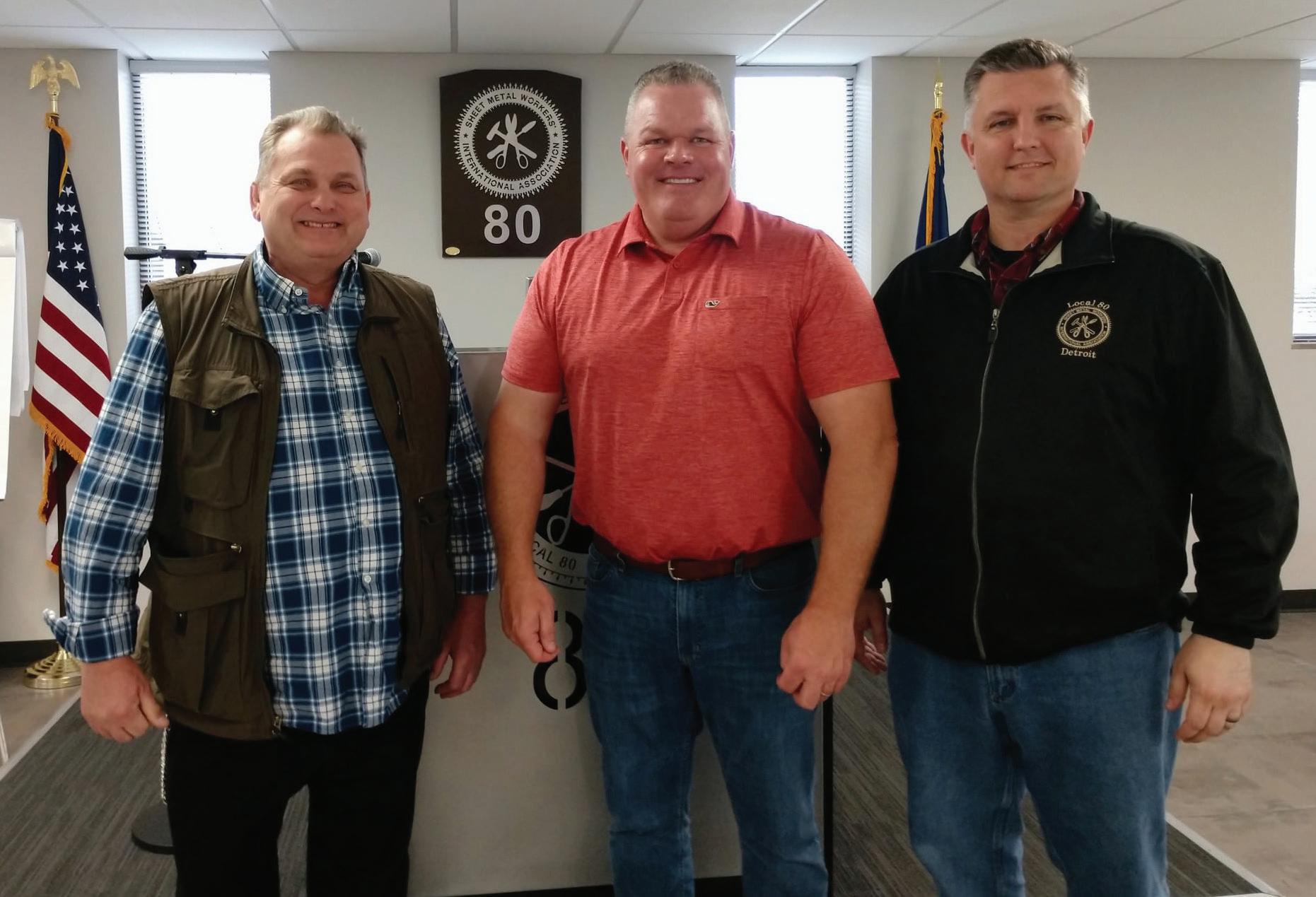
Co-Publishers
KAARIN ENGELMANN editor@pinpmagazine.org
Editor-in-Chief
JESSICA KIRBY jkirby@pointonemedia.com
Editor
POINT ONE MEDIA INC. artdept@pointonemedia.com
Creative Services
Partners in Progress is a publication of the Sheet Metal Industry LaborManagement Cooperation Fund.
All contents ©2023 by the Sheet Metal Industry Labor-Management Cooperation Fund, P.O. Box 221211, Chantilly, VA 20153-1211.

Find Partners in Progress online at pinp.org or at issuu.com/ partnersinprogress. An archive of all issues is available. Issues may be downloaded and printed for no fee.
For comments or questions, email editor@pinpmagazine.org.
2 » Partners in Progress » www.pinp.org
March / April 2023 - Volume 17, Number 2 3 LEADERS ARE MADE... NOT BORN This issue is dedicated to the important work of training and leadership development. 4 LEARNING TOGETHER Florida SMACNA and Local 32 combine efforts to deliver supervisory training. 6 PARTNERS IN SAFETY SMACNA Detroit and Local 80 include BE4ALL education in the Ready to Work Safety Program. 9 TRAINING & DEVELOPING A HAPPY WORKFORCE A happy workforce means a strong industry. Seven tips for helping the workforce be its best. 10 EFFECTIVE APOLOGIES
and SMART members know true leadership means owning your mistakes—and that goes farther than saying, “I’m sorry.” 12 LEARN TO LEAD
leadership
not everyone
14 TRAINING SUPERVISORS—INVESTING IN PROFESSIONALS An investment in leadership development is an investment in the future. 17 CHECK YOUR EGO Five tips to prevent ego from interfering with your learning. 19 MIKE HARRIS: MY JOURNEY ITI administrator Mike Harris lives for training the best in the business. SMACNA & SMART—Building a Future Together
Progress
SH EE T ME TA L AI R R AIL TR AN SPO RT AT ION 6
CONTENTS
SMACNA
While effective
is a critical component of success in any organization,
is born with natural talent in this area.
IN
Partners
Photo: SMACNA Detroit
Leaders are made… Not born
Vince Lombardi, one of the most successful NFL coaches in history, said, “Leaders are made; they are not born. They are made by hard effort, which is the price all of us must pay to achieve any goal that is worthwhile.” Lombardi’s astute observation applies to leadership in all walks of life, including the sheet metal and HVAC industry.

SMART and SMACNA have an army of talented leaders at the national, local, and company levels. This edition of Partners in Progress highlights a good representation of those leaders and provides solid advice from training experts.
While some view the development of forepersons and other supervisors as a contractor responsibility, that is a narrow view. In “Learning Together” on page 4, Florida SMACNA and Local 32 explain how leadership training helps leaders motivate and communicate with their teams in a market with tough non-union competition.
RTW is one abbreviation for “Right-to-Work” laws— present in more than 50% of states—that prevent unions and employers from entering into agreements that require the payment of union dues as a condition of employment. These laws financially impact unions and make it difficult for union contractors to compete with substandard wages and unsafe working conditions.
SMACNA and SMART partners have a long history of respecting that dues deductions support local unions and industry promotion fund contributions support SMACNA chapters and contractors. The effective use of dues and industry funds provide industry stability and support expansion of work and market opportunities.
“Partners in Safety” on page 6 describes how SMACNA Detroit and Local 80 leaders established that in their jurisdiction RTW does not mean Right-to-Work. It means Ready to Work, a comprehensive sheet metal safety program that keeps workers safe and allows contractors to capture jobs that meet owner requirements and safety standards. Most recently, Ready to Work included a BE4ALL survey that helps educate the workforce on SMACNA-SMART’s diversity, equity, inclusion, and belonging initiative.
We are also pleased to congratulate SMACNA Detroit and Local 80 as Michigan becomes the first state in over half a century to repeal its Right-to Work Law, an event that occurred as were finalizing this edition.
In “Training & Developing a Happy Workforce” on page 9, executive coach Joel Garfinkle provide seven great tips for helping the workforce be its best, starting with getting to know what motivates each person and offering training through mentorship.
Everybody makes mistakes. Many of us struggle over a lovehate relationship with apologies. We appreciate it when others apologize to us, but we are challenged when it is our turn to
apologize for falling short. SMART and SMACNA leaders from British Columbia, Western Pennsylvania, and Indiana share their experiences owning and fixing their mistakes and making “Effective Apologies” on page 10.
Industry leadership training expert Stephane McShane of Maxim Consulting shares the personality traits and skills that the most effective leaders in our industry possess. “Learn to Lead” on page 12 describes ways to foster leadership, even when it doesn’t come naturally.
The most technically skilled sheet metal worker is not automatically the best industry leader, asserts training coach and motivational speaker, Kevin Dougherty in “Training Supervisors, Investing in Professionals” on page 14. Find out why industry supervisors have the most impact on the bottom line and why developing these leaders is imperative to a contractor’s ability to compete.
We all know that learning new things requires checking your ego at the door. John Millen, communications expert, describes five ways to tackle new learning opportunities without hindrance from your ego. See “Check your Ego” on page 17 for a calmer way forward.
Michael Harris describes his career journey, which led him from working summers in a sheet metal shop during high school to leading the sheet metal industry’s national training initiatives as administrator of the International Training Institute, in “My Journey” on page 19. Kudos to the Local 20 and the Indiana SMACNA contractors who recognized Mike’s potential early on and assigned him to teach at the JATC while he was still a fourth-year apprentice!
We are confident that those who want to enhance their leadership potential will find insight from the leaders featured in Partners in Progress. We encourage SMACNA and SMART partners to take advantage of the leadership training opportunities available in our industry, and we invite them to share their efforts with jessica.kirby@pointonemedia.com so those stories can appear in these pages and inspire others. ▪
Partners in Progress » March/April 2023 » 3
Photo: Getty Images
Learning Together
Florida SMACNA and Local 32 combine efforts to deliver supervisory training


IIn late November 2022, Florida SMACNA Chapter Consultant Deborah Wyandt received a call from Rich Applegate, president of Applegate USA/United Sheet Metal Company. He wanted to know whether Florida SMACNA could arrange a training program for supervisors and forepersons before the end of the year. Wyandt was unsure. The feasibility of coordinating a program in a relatively short time frame so close to major holidays seemed flawed. Applegate explained, however, that work was going to be slow for the remainder of 2022, which made it a good time—the only time, really—to take forepersons and other supervisors away from their jobsites or the shop. Once the company got into 2023, work would pick up and the window for training would close.
SMACNA National’s education department was quick in approving funding for a supervisory training program and, fortunately, Kevin Dougherty, one of the industry’s most popular speakers on the topic, resides in Florida. Preliminary plans started coming together.


The remaining challenge was finding a hotel or other location with meeting space to hold a training program for nearly 30 attendees so close to Christmas and Hanukkah. One brief call from Applegate to Danny Villarruel, Local 23 business manager, resolved that challenge. Villarruel offered the union hall for the training.
“When Deb Wyandt and Rich Applegate contacted me regarding the training for supervisors and forepersons, I agreed to help in any way possible,” he says. “We all can learn from one another, and seeing things from a different perspective makes us better people, employees, and owners.”
But Local 32 representatives didn’t just provide a meeting room. They set up the room and all audio-visual requirements, supplied breakfast and coffee, recommended caterers, helped with the lunch, and cleaned the meeting room when attendees departed.
“Two Local 32 representatives attended the entire program, which demonstrated to their members that the union supports training and knows the value of having the best trained
4 » Partners in Progress » www.pinp.org
Graphic: @Can Stock Photo / kirstypargeter
Photos by Local 32
supervision in the industry,” Wyandt says. “This level of collaboration came as no surprise. Florida has the toughest non-union competition in the industry. Labor and management must work together as partners to compete in such a tough market.”
Topics covered during the day-long program included
How to be a leader, rather than a boss,
How to be a better listener,
Time management tactics,
Motivation for maximum performance,
Dealing with difficult people,
Minimizing conflict and personality clashes,
How to adjust communication skills to deal with different workers,
Results-oriented problem-solving, and


How to manage amid changing worker demographics.
All of those topics were chosen to help industry forepersons to more effectively motivate and communicate with their teams and enhance their ability to train future supervisors. Resulting increases in employee retention and productivity will benefit both labor and management in the long run.
Attendee feedback was overwhelmingly positive. They complimented Dougherty’s knowledge of the industry and the lively and interactive nature of his presentation. Numerous attendees suggested they would like more training to enhance their supervisory skills.
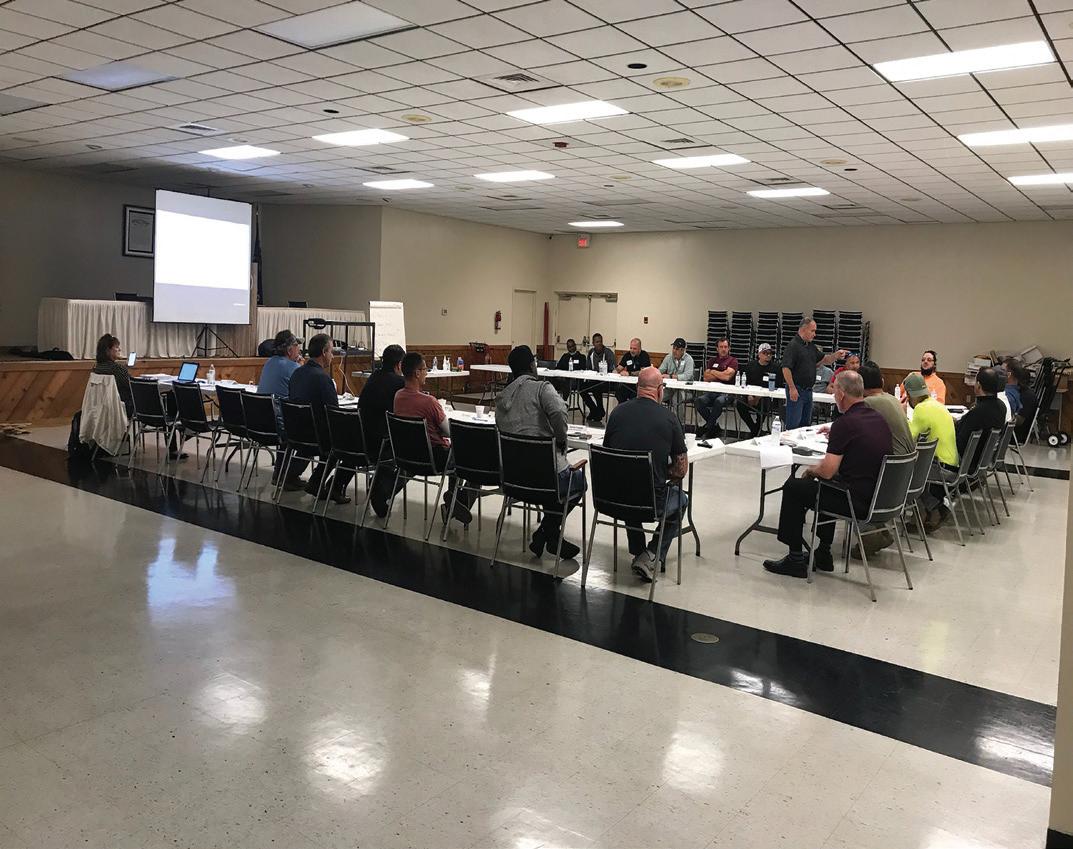
Applegate likewise wished they had more time to devote to this important training. “The supervisory training was extremely helpful and very beneficial to our company,” Applegate says. “Applegate USA/United Sheet Metal has many young forepersons and supervisors running multimillion-dollar projects, and the continued training is critical as we move into the future.”
Participants commented on how the training can be applied to various day-to-day jobsite scenarios. “Kevin did a great job with putting various supervisors in difficult situations that included employee problems, GC problems, and others, and then going through ways to handle the situation to a successful outcome,” Applegate says.
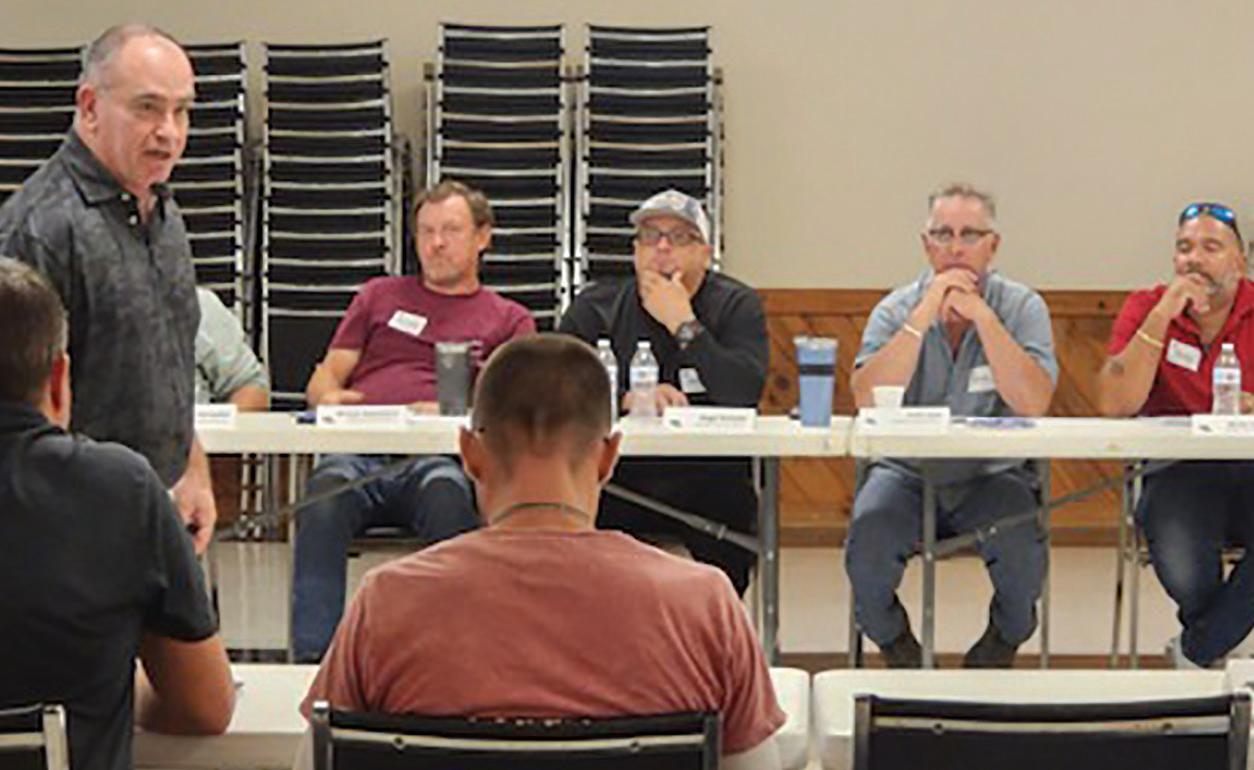
Villarruel noted many teachable moments as participants were able to step-out of their comfort zones and realize the common humanity among the group.
“We are all human and make mistakes, but when you learn from each other—the workforce from supervisors and vice versa—that is when you grow as a person and as a leader and employee,” he says. “It also makes one and all accountable for what they learned during the training so that they can bring it out on the jobsites as we continue working together for a better future for our contractors and members.”
Villarruel is supportive of future training with the Local’s SMACNA partners. “As we continue working together for a better future for our contractors and members, the more we can and should learn together,” he says. ▪
SMACNA National allocates funding each year to conduct a number of supervisory training programs at the local level. SMACNA National lines up the speakers on a variety of topics and covers speaker fees for approved programs. Chapters are responsible for speaker travel costs, meeting room rentals (if necessary), and meals and refreshments for attendees.
A list of supervisory training programs is available on SMACNA’s website under Chapter Supervisory Training Programs. SMACNA Chapter Executives interested in scheduling a program may contact
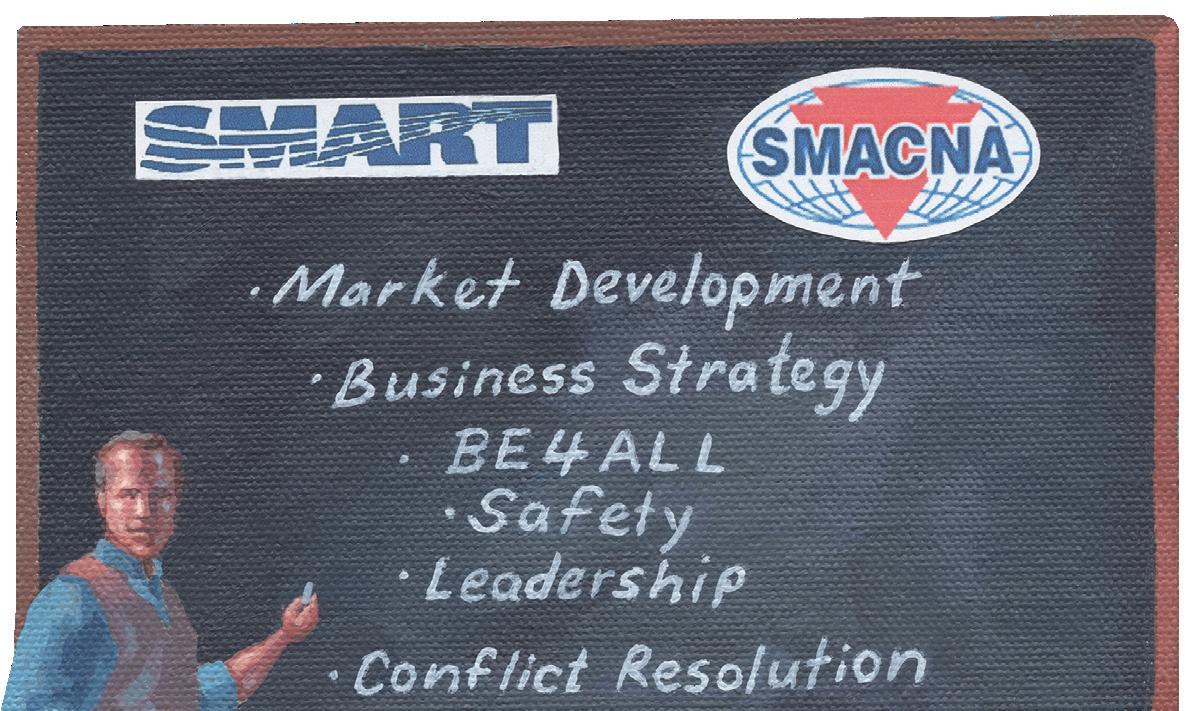

Partners in Safety
SMACNA Detroit and Local 80 include BE4ALL education in the Ready to Work Safety Program
In December 2015, SMACNA Detroit and Local 80 partnered to develop the Ready to Work (RTW) Safety Program, a stateof-the-art safety program that benefits both contractors and union members.

The RTW program is both a database and awareness program. The RTW database is a customized web-based system specific to the sheet metal industry for both union craftspersons and contractors. Workers access the database to complete safety modules and view their complete history of safety and training credentials, and contractors use the database to view these credentials. In addition, RTW program language provides annual incentives for Local 80 workers who maintain a certain level of safety and training credentials.
“This program helps contractors capture jobs as owner requirements and safety standards continue to become mandatory in bid documents,” says Charlene Zezawa, administrator with SMACNA Detroit.
Using this data, an employer can research potential new hires based on what safety training or worksite credentials are needed for the jobsite.
“Our system is like a walking resume for the sheet metal worker,” says SMACNA Detroit Executive Director Mark Saba. “It provides training and records information that is relevant within our industry, specific to that worker and SMACNA Detroit employers.”
“The Ready to Work Program enables our union to be safety pro-active,” says Local 80 Business Manager Tim Mulligan. “Not only does it establish specific safety practices, but also the program creates an opportunity to further promote our longstanding tradition of well-trained union members employed by highly qualified contractors.”
Another aspect of the RTW database system is data integration of existing sources to create a collaborative product. For example, the RTW system uploads for user viewing substance
6 » Partners in Progress » www.pinp.org
By / Jessica Kirby | Photos: SMACNA Detroit
left to right: Eric McPherson, Local 80 Business Agent, Nic Bittle, Owner, Instructor Workforce Pro, Matt O’Rourke, Local 80 Apprenticeship Training Director
testing and general safety training maintained by a longstanding Michigan construction industry standard database called MUST (Management and Unions Serving Together). The MUST system is overseen by a board of Michigan labor and management representatives who work to promote the safety and substance testing database and the unionized construction industry to owners and the general public through career awareness programs.
This year, Local 80 and SMACNA Detroit turned their attention to BE4ALL, a jointly funded SMACNA and SMART diversity, equity, inclusion, and belonging initiative, and they decided to help promote the program.


Their partnership recognized RTW as a platform for promoting BE4ALL among the union membership and employers. “Together, labor and management developed a multiple-choice quiz that highlighted important aspects of the BE4ALL program and incorporated this within specific RTW requirements,” Zezawa says. “RTW incentive participants were required to complete a 10-question quiz that reiterated BE4ALL material found on the SMART website.”
“We can appreciate the way local chapters and unions can help raise awareness and felt we had a good match to be able to assist with SMART’s and SMACNA’s BE4ALL efforts,” Mulligan adds.

Promoting BE4ALL and the RTW program aren’t the only initiatives SMACNA Detroit and Local 80 have tackled together. A few years ago, the two organizations participated in a partnership agreement with Ford Motor Company to implement RTW safety training that was specific to Ford’s construction site concerns.
“One of the big concerns Ford Motor Company had on jobsites was ‘struck by and caught between’ incidents,” Saba says. “So, we decided to incorporate the Ford safety training requirements right into our RTW program. We worked together with Ford Land safety personnel and produced our own module available for all Local 80 workers to complete.”
Ford Motor Company was very pleased with the outcome and collaboration, which was ultimately still specific to the sheet metal industry.
SMACNA Detroit and Local 80 also worked with several Michigan-based general contractors to produce a sheet metal trade-specific silica awareness module in complement to the Michigan Occupational Health and Safety Administration heightened silica protection requirements.
This was another win for the RTW program because as the general contractors were updating their silica awareness standards, SMACNA Detroit and Local 80 were helping capture new safety measures contractors and workers would experience on the jobsites. “Here, we discussed with several prominent general contracting companies their silica awareness procedures and incorporated them into our training,” Mulligan says. “Again, the GCs were appreciative of our joint efforts for the goal of keeping workers safe, together.”
While many industry programs and services were postponed or transitioned into virtual platforms during 2020, SMACNA Detroit and Local 80 used this time to further extend the RTW program technically by developing a RTW smartphone app, available for Local 80 workers through Apple and Android.
Workers can use the app to access the list of their accomplished training certifications, view RTW modules, and receive assistance accomplishing annual incentive requirements with quick access to support. It also includes a SMACNA Detroit contractor directory, personal work log and—coming soon— welding continuity tracking.
“Although the union membership has responded fairly well to RTW, it can be difficult to get the long timers in the field engaged,” Mulligan says. “We have been able to engage the apprentices right at the starting gate of their graduation because of their high involvement with the training center and union hall.”
Although Local 80 discusses the program at the union hall meetings and posts material in the trade paper, “Contractor promotion is also very important, especially to those field craftspersons who are under the care of the employer,” Mulligan says.
Together, management and labor in metro Detroit continue to work to keep promoting and developing engagement, starting with acknowledging their shared role in building the sheet metal industry’s future for all.

For instance, a market recovery program instituted by SMACNA Detroit and Local 80 establishes cost-effective
programs for signatory contractors by developing strategies to secure hours and increase market share within the construction industry. “We work with SMACNA Detroit just about daily to help gain work for the contractors for the betterment of their companies and our members,” Mulligan says. The partnership even overextends training with collaborations to provide communication and transition training for their foreperson and apprenticeship workforce.
In addition to organizational programs, the partnership has joined to work on important community-based initiatives. “As partners, we’ve been better equipped to make charity donations that involved sending lunches to hospitals during COVID, renovating non-profit shelters, and providing equipment and workforce to build new homes for health and welfare-based organizations in the Southeast Michigan area,” Mulligan says.
“A mutually respected relationship with between labor and management is key to SMACNA Detroit and Local 80’s success,” Saba says. “A strong partnership broadens the scope of initiatives contractors and their workforce can take on. Respect and purpose are important for our future and the members we both care for.” ▪
Jessica Kirby is editor-publisher for Point One Media, a small but sturdy family-owned trade magazine creator representing some of North America’s best construction associations. She can usually be found among piles of paper in her home office or exploring British Columbia’s incredible wilderness.
8 » Partners in Progress » www.pinp.org
Essentials for Training & Developing a Happy Workforce 7
 by Joel Garfinkle
by Joel Garfinkle
Leaders can use their training—both internal and external— to develop a happy workforce with people who are motivated and want to build up their companies and the industry. When everyone is onboard working for the common good, great things happen.
So what steps can leaders take in developing motivated, productive workers? One key lies with effective training. Here are seven keys to training and developing employees.
1. Train workers in jobs they like.
Transfer responsibilities from your worker that he or she finds boring, dull, or uninteresting. There are others for whom routine gives security. This frees up your worker to take on new and more interesting work. When your staff finds their jobs exciting and challenging, they will be happier and more productive.
2. Give workers room to develop more control.
Help workers self-manage. For some you can simply let them loose. You may set the deadlines but allow them to choose how they meet those deadlines.
Others may need some training to develop the schedules and habits of independent work. You may offer systems, calendaring methods, prioritizing, and other ways to assist them to be more effective and in control. And for even greater impact, consider sponsoring leadership or productivity training to speed their progress. As they feel the freedom and control over their lives and decisions, they will be more willing to perform at a higher level. They will be happier employees.
3. Let workers establish goals, priorities and measurements.
Your workers understand the on-the-ground issues. They can see what realistic goals and measurements should be. When you give them this freedom, you train them in valuable skills and develop trust and teamwork.
4. Teach with upscale contacts.
You can begin developing your employees by giving them access to key information. Invite them to important and desirable meetings. They will want to use the knowledge they gain for the company good. Include your employees on key mailing lists or company briefings. By following the executive’s thoughts and planning, you guide them to grow those leadership skills.
5. More face time.
Give workers more time with leadership. As someone works with supervisors, there are mentoring opportunities. They see successful skills in action. They recognize what’s important to the team and company and why. This subtle training leads to more informed and productive workers.
6. Offer in-house training and development.
Make the workforce happy by teaching them on the job. They don’t need to leave or travel. They miss less time from their jobs. If they need more guidance than you can provide, enlist the help of a coach to instill executive presence skills.
At the same time, company and industry training is ideally specific. The terminology and culture are already in place. It’s easy to see how the training fits within the environment of the workplace.
Company training gives them highly specific knowledge related to their role, too. It’s easy to see how the training fits within the framework of the job and workplace. For aspiring leaders, learning how to command executive presence is one of the most valuable trainings for retention and engagement.
7. Ask employees to train others.
When workers attend trainings or have a skill set, let them share with others. Sometimes co-workers can explain things more effectively. Because it’s peer-to-peer it may allow more open discussions and questions. It also gives leadership opportunities and prestige to the presenter.
Every organization needs to be aware of workers’ desire to excel and then get proactive about retention opportunities. When workers are given chances to develop and train, they will become a more productive and satisfied workforce. The organization will attract top talent and gain a reputation for happy workers. ▪
Joel Garfinkle is recognized as one of the top 50 coaches in the United States and the author of seven books, including Getting Ahead: Three Steps to Take Your Career to the Next Level. Visit Joel online at garfinkleexecutivecoaching.com. Subscribe to his Fulfillment@Work Newsletter and receive the free e-book, 41 Proven Strategies to Get Promoted Now! copyright ©2005-2023 Joel Garfinkle, All Rights Reserved. Reprint permission granted.
Partners in Progress » March / April 2023 » 9
Effective Apologies
By / Sheralyn Belyeu | Photos: Local
“We used to have a very hostile environment within our Local,” says Greg Blose, president of Local 12 in Pittsburgh. “Contract negotiations were over the top. I was almost ready to quit my job as an elected business agent.”
“I’ve heard horror stories about personal attacks,” says James Strother, SMACNA Western Pennsylvania executive director. “People were throwing things and going across the table with each other.”
This kind of antagonistic atmosphere can develop in any organization that fails to support and foster basic character traits like humility, honesty, and fairness. “We tend to hire people based on technical skills, but that can come back to bite us if they don’t have strong ethics and social-emotional intelligence,” says Don Riling, president of the LeaderBuild Institute. “Great leaders should value integrity and humility and are not afraid to let other people see their weaknesses.”
Acknowledging mistakes is one of the fastest ways to improve the workplace, but it can be frightening. “Leaders often fear that admitting to a misstep disqualifies them from their positions,” says Richard Mangelsdorf, business manager at Local 280 in Surrey, British Columbia. “I believe the exact opposite. It’s not a big deal to make a mistake because ultimately everybody realizes that you’re human. If you accept mistakes and grow, so that you’re not constantly making them over and over, people don’t expect you to be a superhero. The best thing you could do is get your ego out of the way and be real with people.”
 Jeremy Hallman, executive director of SMACNA-British
Jeremy Hallman, executive director of SMACNA-British
Columbia, finds that acknowledging his own imperfections makes it easier for others to be honest with him. “If someone made a mistake and they’re afraid of you, they try to hide the mistake, which makes things worse,” he says. He makes sure subordinates know that he has overcome similar errors. “Then you can go over what happened and train and teach,” he says.
Hallman doesn’t like to use the word “you” in these discussions. “I ask ‘Where did we go wrong?’ not ‘Where did you go wrong?’” he explains. “I probably put them in that spot, and I’ve probably given them information. I need to take some blame myself when they make a mistake.”
“The key is taking ownership, even if a mistake wasn’t directly attributed to the leader,” agrees Joseph Lansdell, president of Poynter Sheet Metal in Greenwood, Illinois, and former president of SMACNA. “If the leader delegated someone to do the task and it did not turn out right or there was a mistake made, a true leader takes ownership of all mistakes. They have responsibility.”
Ownership and responsibility do not mean that a leader knows everything or makes decisions alone. “There’s always something that you can learn from somebody else,” Mangelsdorf says. “No one person has all the answers. I’m known for coming up with some creative answers, but often I’m missing a very basic solution that would make things easier, simpler, and cheaper.”
Successful leaders find someone they can counsel with— whether a board of directors, experienced colleagues, or experts at SMART and SMACNA. Mangelsdorf advises leaders to
10 » Partners in Progress » www.pinp.org
True leadership means owning your mistakes and making them right—and that goes farther than saying, “I’m sorry.”
12
Image: @Can Stock Photo / Copestello
check their egos at the door. “I ask if I am making a decision because it’s the best for my membership or if am I making a decision for myself,” he says.
Once he was elected business manager, Blose followed these principles to improve communication with SMACNA. He started by picking up the phone. “The clashing got us nowhere,” he says. “I would call the contractors on the JATF committee and pick their brains instead of acting like I was running the show. They would call me back with their ideas.”
These dialogs created an environment where people felt comfortable voicing their opinions. “When leaders see every difference as a personal attack, they’re going to shut conversations down,” Mangelsdorf says. “It is up to the leaders to have the confidence to take new ideas—even criticism— and not feel like their livelihood is in jeopardy. Ask yourself if there’s a path to a better outcome in what the other person is saying.”
Honest conversations allow Local 12 and SMACNA Western Pennsylvania to solve most problems informally. “Now anytime the union’s thinking of filing a grievance, they contact me first,” Strother says. “Sometimes I’m able to work it out, and we don’t have to go through the process.” SMACNA and Local 12 went six or seven consecutive years without a single grievance coming to a hearing. “I could impose fines, but that doesn’t do anybody any good,” Blose says. “I’m not out to punish anybody. If you can work it out and get a good relationship, it’s a win-win for everybody.”
Their new rapport gave Local 12 and SMACNA Western Pennsylvania an advantage when they financed their JATC improvements. Local 12 took out a $3 million dollar construction loan to build a new training center, remodel the union hall, put a new roof on the HVAC/welding center, repave the parking lots, add new sidewalks, and have building exteriors repainted. By the time they completed the JATC upgrade, leaders at SMACNA Western Pennsylvania and Local 12 trusted each other. “A thousand decisions had to be made, and all those decisions were made jointly,” says Strother. “There was never
any arguing or fighting. There seems to be a permeating attitude that what’s best for everyone is going to be best for me.”
The Local and SMACNA jointly hired a grant writing service that helped them secure about $2.6 million in state and iTi grants. Unions frequently apply for grants alone, so SMACNA’s involvement made their application stand out. “We have had many politicians, senators and congressmen, tour our training facility over the years,” Blose says. “They all stated that when unions and contractors demonstrate teamwork and collaboration, it really helps with securing grants.” The grants allowed them to pay off the construction loan in just three years and eleven months.
This kind of success is exactly what Riling predicts. “The people with the best relationships,” he says, “get the best results.”
“There is more of a spirit of collaboration with contractors these days,” says Scott Parks, former business manager for Local 20 in Indianapolis. “I think everyone recognizes we have goals we have to achieve. If contractors have a problem, it is my problem.”


Strother does not remember Blose apologizing for his predecessor’s harshness. In fact, verbal apologies haven’t been an important part of their relationship. “I don’t know that I agree with just saying I’m sorry,” Strother says. “Most people want action. I think the most important kind of apology is righting a wrong. If there was a deficiency, and they corrected it, that goes a long way.” ▪
A Colorado native, Sheralyn Belyeu lives and writes deep in the woods of Alabama. When she’s not writing, she grows organic blueberries and collects misspellings of her name.
Partners in Progress » March / April 2023 » 11
Local 12 and SMACNA PA collaborated to finance and build a $3 million enhancement project at the local JATC. After making “a thousand decisions” together, their trust was set in stone. Photo: Local 12
Local 12 and SMACNA PA had an important advantage in seeking grant funding: labor-management cooperation. Photo: Local 12
Learn to Lead
By / Natalie Bruckner

“What’s the number one trait of a great leader?” asks Stephanie McShane, director of Maxim Consulting Group. “They will end a sentence with a question mark, rather than a period. I’m not saying every sentence is a question—because as a leader you do have to solve issues—but you have to consider whether you have asked enough questions to understand the concern from the person sitting across the table from you. Are you listening just to respond or are you actively listening?”
In today’s fast-paced and ever-changing construction landscape, great leadership has become crucial. An organization’s success, as well as the success of its labormanagement partnership, can largely depend on its leaders’ effectiveness. They must be able to resolve conflicts, attract and retain talented employees, and drive business growth
through scaling up. And yet, McShane, who has worked with hundreds of construction-related firms, says leadership is a trait that doesn’t come naturally to the more seasoned generation in the sheet metal industry.

“For those of us who have been in the industry for decades, we were brought up with a dictatorship model,” she says. “You were told what to do and you did it. Collaboration was not a thing. It was a case of, ‘Do it because I said so’. Let’s be honest, the dictatorship model never worked, but it was all we knew. We have had to relearn what leadership looks like, and I think the younger leaders stepping up are helping us swing that pendulum back the other way,” McShane explains.
Effective leadership might be a critical component of success in any organization, but not everyone is born with natural
12 » Partners in Progress » www.pinp.org
/
Image:
@Can Stock Photo
Marisha5
leadership skills. According to McShane, the good news is that anyone can learn to be an effective leader with the right mindset and approach. However, there is one condition: the person must be willing to put in the effort and commit to ongoing selfimprovement. “While some personality types tend to have an easier time stepping into that leadership role, anyone can learn … as long as they are willing.”
McShane explains that while some personality types may find it easier to step into a leadership role, it’s what motivates people that can determine their success in this area. A servant leader, who is motivated by helping others succeed, is more likely to develop into a great leader. Egocentric leaders may need to leave their egos at the door in order to develop their leadership skills. The key is for the person to be self-aware and willing to listen to feedback and guidance.
While some can develop great leadership skills with the right training and guidance, others may struggle to acquire these skills, even with coaching and practice. “I had a young man who wanted a promotion,” McShane says. “Technically, he was extremely solid, but his people skills were horrible. He wanted a promotion that would put him in charge of people. We gave him some coaching and had three newer employees report to him over an 18-month period. After six months, two of the trainees quit and one didn’t progress much at all. So, what does that say? If you can’t be effective with three people, you can’t be put in charge of more. That was a very difficult lesson for this individual, but he needed that ego check to understand where the issues lie.”
This example underscores the importance of recognizing and addressing skill gaps in a timely manner. While it’s possible for people to develop their leadership skills over time, it’s important to acknowledge that not everyone may be suited for an advanced leadership position.
It is a misconception that leadership skills are only beneficial to those in managerial positions. Learning how to lead well is important at every level of an organization—whether a foreperson, apprentice, or rank and file Local member or employee.
“Everyone benefits from leadership training,” McShane says. “It can help individuals develop key skills, such as communication, problem-solving, and conflict resolution, which are essential for success both in and out of the workplace.
“The problem is training on the soft skills part of the construction industry was laughed at years ago,” she adds. “The idea of playing nicely in the sandbox was just a big joke. In the sheet metal industry, we still spend the lion’s share of our training time on hard skills, but by doing this we are missing part of the picture. Leadership training is something that you can easily adapt into your everyday life. It’s a powerful skill and essential when you are in the business of people, and that’s what the sheet metal industry is.”
Effective communication and leadership skills can also be critical in repairing strained labor-management relationships and achieving overall industry success. Experience shows even the most contentious negotiations can turn around when both sides feel heard and are willing to work together.
McShane describes an example involving a contractor who experienced a particularly difficult negotiation with the Local. “That person reached out for advice on how to communicate better and align themselves with their Local,” she says. “We organized a joint strategic planning session with labor and management and asked both groups to come up with 10 points that they needed to accomplish in that negotiation. When they went into that negotiation, they had a foundational understanding of where the industry was going and what needed to change. By communicating, they had established trust and the negotiation was a success.”
While leadership training can be powerful, McShane cautions that it’s not a quick fix for addressing all leadership issues within an organization. It’s important to consider the person delivering the training, as employees are more likely to respond well to someone they respect.
“Otherwise, you are setting up for failure,” McShane says. “I’m a really big fan of creating subject matter experts within organizations. We need to have leadership people in place at all different levels of an organization who can help develop people, who can continually live that, show it, and mentor it. That is what will have a bigger impact in the long run.” ▪
Stephane McShane provides industry-specific leadership training for labor and management organizations. Reach out to Stephane at stephane.mcshane@maximconsulting.com to take advantage of offerings in supervisory training.
Natalie is an award-winning writer who has worked in the United Kingdom, Germany, Spain, the United States, and Canada. She has more than 23 years experience as a journalist, editor, and brand builder, specializing in construction and transportation.
Partners in Progress » March / April 2023 » 13
{ }
“It is a misconception that leadership skills are only beneficial to those in managerial positions. Learning how to lead well is important at every level of an organization.”
Training Supervisors— Investing in Professionals
By Robin Brunet : Photos: SMACNA
It’s a testament to Kevin Dougherty’s effectiveness as a motivational coach that he is extremely hard to pin down. If he’s not getting ready to board a plane to conduct a seminar in one state, he’s busy training new and experienced supervisors in another.
But pinning him down is worth the effort because his message to the sheet metal sector is alarming. “The organized sheet metal industry faces numerous headwinds,” he says. “We have an
aging workforce, not enough new people coming into the trade, and our market share nationwide is only 18% compared to nonunion shops.”
While none of this is news to industry veterans, Dougherty caps his comments with a revelation. “A big part of the problem is that we’re failing to create leaders. Currently, we have an intense focus on apprenticeships, which is good as far as recruitment goes, but the system doesn’t take people to the next level.”
In other words, you can be the best craftsperson in the world, but that doesn’t equate to success as a leader. After all, how many sports Hall of Fame players went on to become Hall of Fame coaches? Very few.
“So, we’re doing a good job of producing sheet metal workers, but we need to turn them into mentors and coaches by investing in proper training,” Dougherty says. “And until that shortcoming is addressed, we’re going to continue losing market share.”
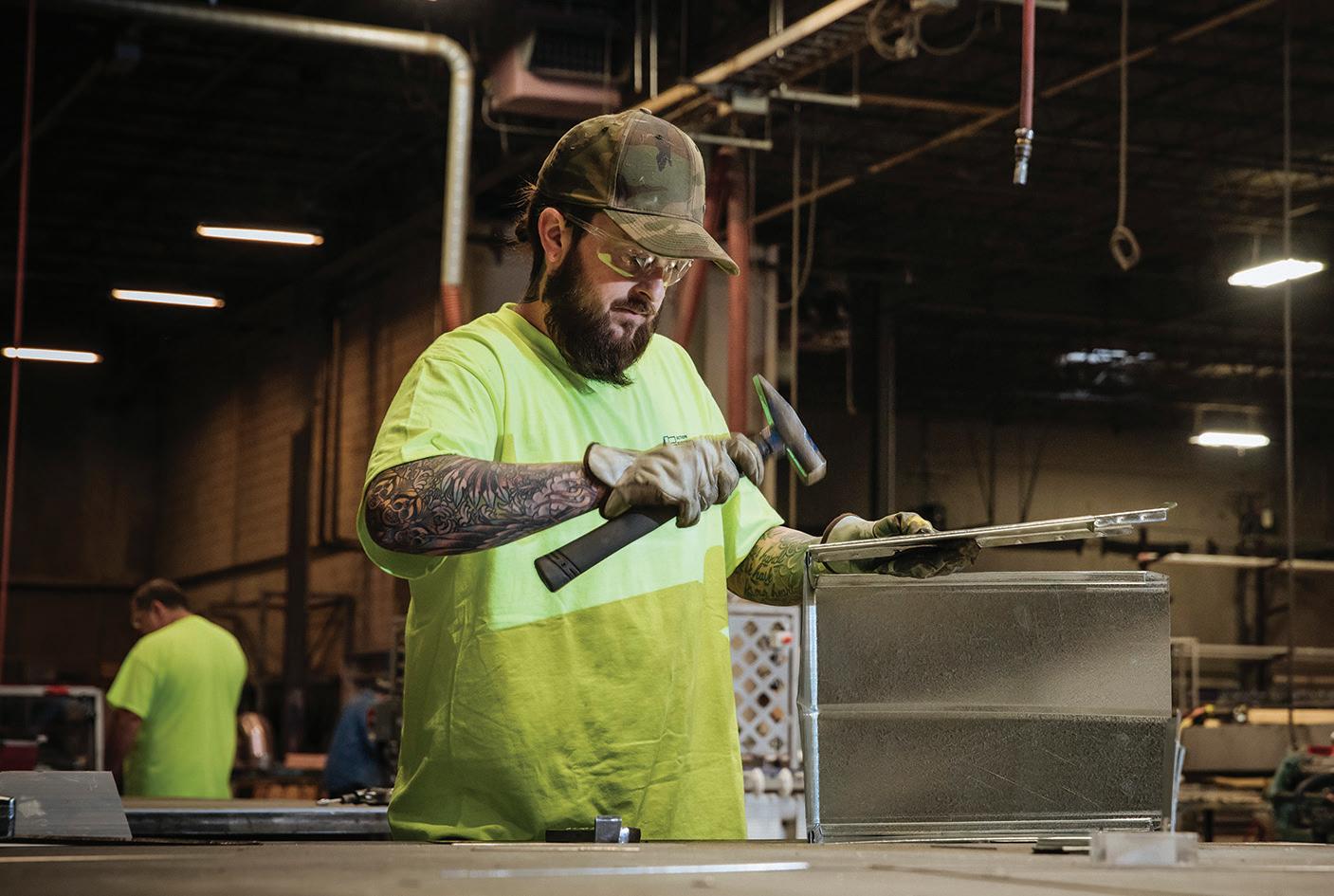
Dougherty, who has taken time to discuss this issue from an airport departure lounge in his home base of Florida, has spent the past 20 years enhancing the efficiency of America’s construction industry. Via his Supervisor Training Academy, he has coached thousands of people from coast to coast, and his clients range from family-owned businesses to corporate conglomerates.

14 » Partners in Progress » www.pinp.org
Audiences describe Dougherty’s speaking style as aggressive, realistic, and open minded, and he points out that forthrightness is required to shake some companies out of their doldrums. “There’s a widespread assumption that, over time, as journeypersons gain more on-the-job experience, they naturally evolve into leaders,” he says. “But that’s not the case. Instead, too often bad habits develop. One of the most troubling is showing up late for work. And journeypersons who are true professionals have so much on their plates, they often don’t have the time to mentor promising would-be leaders.”
And professionals they are, though they seldom receive the credit they are due. “In my capacity consulting for SMACNA and SMART, I’ve stressed that these people should be treated like professionals, because they’re really working engineers with a great understanding of technology and are far more capable than they’re credited.”
However, a well-rounded foreperson or supervisor is crucial to any business’s bottom line. “Every dollar your company makes or loses runs through the supervisor’s fingers,” Dougherty explains. “His or her ability or inability affects profits. There is no single thing that can make more of an impact on the bottom line than having an efficient and effective supervisor who understands the need to maximize labor efficiency.”
and building them back up. It’s a tough process somewhat akin to Marine Corp training, but it gets results,” he says. “People are better than they think, and I make them realize it. All the while, I reinforce the job elements that should be non-negotiable—such as showing up on time.”
He references the Marines because, like that military institution, he is looking to influence a cultural change. “This is not about checking a series of boxes, it’s about developing a specific mindset along with skills,” he says.
The program also covers planning, material handling, negotiations, conflict resolution, accountability, communication, time management, documentation, and people skills.
“The Supervisor Training Academy is not for the weak,” he says. “We start fast and finish fast, and the content is real world and tangible.”
Video recorded role-plays augment the program, and attendees received a ‘bullet’ journal to help them plan, organize, and effectively execute time management skills over the long haul.
Dougherty tailors his training approach depending on the company and sector, but for the HVAC/sheet metal realm he recommends his program for forepersons, shop forepersons, superintendents, and other critical managers.

Dougherty’s flight is suddenly announced over the airport loudspeaker, and he apologizes for having to dash. But before he hangs up, he says leadership training is imperative.
For example, 75% of a project’s value can be attributed to labor and material. Labor cost affects profits, and decreasing labor cost by a mere 5% can increase profitability by 20%. “Finishing the job in 19 days instead of 20 days can increase profitability by 20%,” he says. “Using the right crew mix—bringing in 19 workers as opposed to 20, for instance—makes a dramatic difference. All these issues and opportunities can and will be made at the frontline supervisor level. A $1 million job with a 5% profit is $50,000. It does not take much to change the bottom line one way or the other. If we cut labor cost by $25,000 through better supervision, that savings goes directly to the bottom line and increases profitability.”
Typically, Dougherty spends two days working with between 20 and 25 new and experienced supervisors, “breaking them down
“I’m optimistic because leadership development is happening,” he says. “There’s no question that contractors and Locals who provide employee education and training reap the rewards of their investment. Professionals want to work alongside other professionals, and when you have that kind of culture you cannot help but succeed.” ▪
Contact Kevin Dougherty at salesacademy@verizon.net to learn more about the Supervisor Training Academy. SMACNA chapter executives can coordinate with Bridgette Bienacker, SMACNA’s Senior Director of Education, bbienacker@smacna.org, to request approval for a local presentation. If approved, SMACNA National will cover the costs of the speaker fee.
Robin Brunet’s journalism has been published in over 150 magazines, newspapers, websites, and other media across Canada and the United States since 1982. He is also the best-selling author of two books: Red Robinson: The Last Deejay and Let’s Get Frank, as well as the upcoming The Last Broadcast.
Partners in Progress » March / April 2023 » 15
“There’s no question that contractors and Locals who provide employee education and training reap the rewards of their investment. Professionals want to work alongside other professionals.”
— Kevin Dougherty, leadership training specialist
Making Sure Ego Doesn’t Interfere with Learning
By John Millen
Having an ego is not a bad thing, but whenever ego is discussed at work, it’s typically not in a positive light. It’s usually about arrogance, as in “his or her ego is completely out of control.”

Cambridge Dictionary defines ego simply as, “The idea or opinion that you have of yourself, especially the level of your ability and intelligence, and your importance as a person.”
Ego is how we understand ourselves and sometimes, unchecked, our egos fight to maintain that image and put us on a collision course with people and with trust.
In a learning environment, we need to be open to new things, which first requires admiting we don’t know everything there is to know about a subject. It means admitting a deficency in our knowledge, a vulnerability. This admission is difficult for some and difficulty is the food that can fuel an unckecked ego to monumentous proportions.
People who are described as egotistical are seen as takers,
not givers. They can be seen as cocky, self-centered and, often, bullies. We see those manifestations of ego on display every day in our public arenas such as sports, politics, and business. We don’t want to work or learn with people like that.
In social or other group situations, we see it come to life as one-upmanship, infighting, and passive/aggressive behavior. Our egos may spur jealousy, backstabbing, and unproductive, often toxic, environments.
It’s funny because this kind of egocentric behavior often comes from a place of insecurity and fear. The person doesn’t feel confident and lashes out to exert control.
This makes sense. Buddhists believe that most of the pain we suffer as human beings stems from our desire for love, recognition, wealth, or power. That’s why they advocate killing—or at least controlling—the ego.
It’s our ego, uncontrolled, that trips us up. Controlling and even comforting our egos is the first step to an open mind,
16 » Partners in Progress » www.pinp.org
Image: @Can Stock
Photo / Orla
ripe for learning. With this in mind, here are five key mindset shifts and actions that will help you to manifest the benefits of controlling your ego in business, learning, and in life.
1. Stop and breathe, or walk away
As children, we are taught to pause and count to 10 before we impulsively react to a situation. Our emotional reactions, especially negative ones, rarely result in a positive outcome.
Whatever it is, take the time to pause and regroup before you respond. When you do respond, try a positive response.
I recently had to do that myself. I rarely get angry, but I was mad about an email that I felt was unfair. It was nearly midnight and I was exhausted from preparing for a client’s program. I impulsively wrote back a harsh response.

But I never sent that email. Instead, I deleted the email addresses on the note, put it into my draft file, and went to bed.
In the morning, I reopened the email with a different perspective and actually laughed about how out of control the writer (me) sounded. I deleted it and sent a very positive, rational response. It was received well and the problem was quickly resolved, saving the relationship.
3. Stop being selfish
Our egos also show up when we give presentations or talk in meetings. I say presentation anxiety is selfish because our nerves come from a focus on us, instead of on our audience –the people to whom we are supposed to bring value.
Our ego makes it about us. I’m being judged. They might reject me. I’m not performing well. The ego-less approach focuses on their needs.
4. Lose control
Try losing control, but in a good way. It’s the paradox of leadership and life. The more we try to control people, circumstances, and events, the more likely we are to lose them.
5. Be a giver
In the 1700s, Samuel Johnson said, “The true measure of a man is how he treats someone who can do him absolutely no good.”
2. Seek first to understand
For the third time in a month, I find myself thinking of Stephen Covey’s 7 Habits of Highly Effective People, specifically the habit, “Seek First to Understand.” When our ego drives our thinking, we tend to focus on our primitive needs and feelings: Am I being disrespected? Am I still in control? Am I losing?
Then our egos give us negative self-talk: that person hasn’t answered me, I must be in trouble. She hates me. My boss isn’t acting as friendly as usual. What’s up? Did I mess something up?
Shift your perspective and think of alternative reasons. Seek to understand. We tend to go right to the negative. Maybe she’s busy or missed your email. Maybe he has a sick child at home. There are so many explanations. Reserve judgment until you hear from the source.
As I wrote in “Should You Be a Giver at Work?”, research by professor Adam Grant shows that everyone knows who the givers and takers are at work and that, in the long term, takers lose and strategic givers win.

Think about how you show up and how you respond to life’s everyday situations at work, at home and elsewhere in life. It turns out that less ego and more focus on others will ultimately give you less stress, greater personal satisfaction and more external rewards.
All of these benefits will, by the way, will also make your ego happy. ▪
John Millen, storytelling and communication coach, conference speaker, and course creator, has more than 25 years of communication experience, including serving as VP of Communications for Fortune 100 companies Nationwide and The Hartford. His purpose is to help leaders and entrepreneurs grow their businesses and careers by developing their storytelling and communication skills. Learn more at johnmillen.com
Partners in Progress » March / April 2023 » 17
Image: @Can Stock Photo / Gajus
Image: @Can Stock Photo / Prazis
My Journey: Mike Harris Administrator, Industry Training Institute
Mike Harris came to the sheet metal industry like so many others—by birthright. “My father, two uncles, and brother were all sheet metal workers, so you could say it was in my blood from the start,” he says “During the summers when I was in high school, I worked for the specialty sheet metal company where my father worked. I was always amazed by the metal creations that were being made from flat sheets of metal.”
After graduating high school, Harris attended college for a year before deciding that it wasn’t for him. “It was at that time, 1987, that I went to work full time as a sheet metal worker so I could learn how to create these ‘metal masterpieces’ that had captured my attention throughout the years.”
He started his apprenticeship in 1991 and started teaching part time at the Local 20 training center during his fourth year. In 1997, he started teaching full time, and by 2000 he’d taken over as director of training for the statewide training trust.
In 2005, Harris joined the ITI staff as a welding assessor, and in 2009 he took on the role of program administrator, overseeing programming and instructor training and managing field staff. In 2022, he took the reins as administrator at the ITI.

“As the administrator of the ITI, I can say that not every day is the same,” he says. “Since I travel a fair amount for work, my day may start in our office, an airport, a hotel, or some other venue across the country attending meetings or brainstorming with other industry members.”

Regardless of where he starts his day or the subject of the meeting he’s attending, Harris’ days typically involve problem solving on some level. “The part I like the best is that we are always focusing on how we can better provide training for SMART members to continue to move the unionized sheet metal industry forward,” he says. “So, the best part of my job is knowing that it can make a difference for our members and this industry.”
Harris hopes to continue to build on ITI’s success, adding new instructional offerings and developing programs for the sheet metal workers of tomorrow.
“The training system in the unionized industry is second
to none,” he says. “Our industry expends a lot of resources focusing on educating our members so that they are the best trained and highly skilled workers in the sheet metal industry.”

The ITI also develops world class curriculum and programs for instructors because great teams begin with great leaders.
“Becoming a better leader is crucial for any team’s success,” he says. “A team will never outperform the leader’s ability to lead, so leadership education is paramount to our success as a team and organization.
“I genuinely believe that the ITI trains the best and the brightest,” he adds. “Our instructors are top notch, our programs are among the most advanced and dynamic in the industry, and our staff is second to none.”
For anyone just starting out in sheet metal, Harris says the industry has a place for everyone willing to work hard. “From the different types of work to the different positions that someone can aspire to, the sky is truly the limit,” he says. “Everyone’s journey through this industry will be different depending on their talents, skills, and desires. I could have never imagined the path that my career has taken through the years. The journey is more important than the destination. Taking the journey with union brothers and sisters makes it much easier than going it alone.”
Building on the industry’s important progress in labormanagement partnering is key to moving the industry forward. “We are truly all in this together,” Harris says. “Our collective strength is dependent on the talents of all involved.”
While labor and management will not always agree on everything, having a good relationship helps everyone get through the difficult discussions that inevitably come up from time to time. “I read something years ago that said, ‘How groups work together during the difficult times typically determine the longevity of the group,’” Harris says. “In our case, the group is the unionized sheet metal industry.” ▪
Title 18 » Partners in Progress » www.pinp.org
Trying to get your Local, JATC, or company noticed?

Expertise is more than experience. It is skilled knowledge. Let your customers know there is a reason to hire you. Use Expertise logos on all of your promotional materials.

Get the details at pinp.org





I-01





















 by Joel Garfinkle
by Joel Garfinkle
 Jeremy Hallman, executive director of SMACNA-British
Jeremy Hallman, executive director of SMACNA-British




























